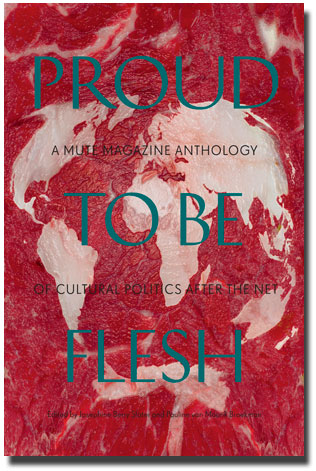Chapter 5: Introduction – Organising Horizontally

Introduction to Chapter 5 of Proud to be Flesh – Organising Horizontally
—
The internet’s structure as a distributed network was seen by many as providing the tools with which to run mass experiments in direct democracy, perhaps for the first time. The appearance of the World Wide Web in the early-’90s was accompanied by new forms of political activity, coordinated across the internet, which took on analogously distributed and networked forms, and helped to grow the anti-globalisation movement which culminated at the end of the decade.
The aim of many of these emergent political organisations and platforms was to supersede the outdated vanguardism of the party form and to forge alliances across diverse groups, without the need for a controlling centre, a clearly defined ideology or a set of goals. While this revitalisation of political energies by the net was doubtless also felt on the right, Mute was concerned with its anti-capitalist manifestations. As the decade wore on, and open publishing sites like Indymedia and alliance-political experiments came of age, we found our pages increasingly filled with debates around the viability of so-called horizontality.
The first sustained analysis of the new political shoots of many-to-many media in Mute was Richard Barbrook’s article, ‘Holy Fools’. In it, he traced the left’s disillusionment with party politics post-May ’68, through the ‘schizo-politics’ of Deleuze and Guattari and its latter-day, and purportedly de-politicised, re-adoption by the digerati. For Barbrook, the professed rejection of vanguardism by the New Left – alongside the project of modernity tout court, in the name of psychologised ‘molecular revolution’ – nevertheless gave rise to a kind of covert elitism and snobbery within the political and artistic avant-gardes. According to Barbrook, writing in 1998, the digerati were adopting D&G and their ‘poetry of flows’ as a way of feigning progressiveness while abandoning revolutionary politics in the aftermath of the Soviet Union’s collapse. Unnoticed by these ‘techno-nomads’, however, capitalism was quietly withering away in the net, as the gift economy was normalised and mass participation in media gave rise to a far more experimental culture than that of the official avant-garde.
The year following Barbrook’s text saw an explosion of anti-capitalist activity and civil disobedience, with London’s financial district sustaining millions of pounds worth of damage during the Carnival Against Capitalism (J18), and, later, the mass boycotting of the WTO meeting in Seattle (N30). These events triggered a wave of protest that finally broke with the events of 9/11 – or so left mythology would have it. But, reading across the articles we published on the question of organising and alliance-based politics at the time, it seems that the seeds of dissolution were sown from the start in highly festishised, but broadly under-examined, forms – horizontality and openness. As Eileen Condon describes in her text on London’s May Day, 2000, the ‘confoundingly atomised’ protests of J18, in which a clear anti-capitalist message was given, had degenerated into a ‘locatable, better containable core’ whose message was easily hijacked. The Guerrilla Gardening escapades in Parliament Square and the Cenotaph’s defacement were interpreted as an attack on the nation, with Reclaim the Streets acting as spokesperson.
Writing in 2002, Horacio Tarcus touches on similar experiments with leaderless organising in the context of Argentina’s economic crisis. As the country’s economic meltdown led to the widespread rejection of parliamentary politics and the state’s loss of legitimacy, Assemblias, or neighbourhood assemblies, sprang up across the country. Here, people debated and decided upon local issues, often for the first time. Of course, despite the revolutionary hopes vested in these direct democratic structures, Tarcus describes the power struggles which took place within them between independents (in which ‘a good deal of libertarian mettle exists’) and party members. The complexity of this particular situation, and, indeed, the problematic in general, lies in the simultaneous attempts at ‘rejecting politics’ and ‘politicising society’.
It is this complexity which J.J. King picks up on in his careful study of the so-called ‘open organisations’ of the anti-globalisation movement. Using the tools of the web and adopting the collaborative working methods of Free/Libre Open Source Software (FLOSS), many groups ran, and continue to run, experiments in dismantling the ‘formal hierarchical membrane of groups’. Despite making declarations of organisational openness and a general faith in the progressiveness of these structures, closer analysis revealed that ‘tacit control structures’ tended to emerge. The tearing away of hierarchical structures seemed to allow for the self-reinforcement of the inequities which structure society in general.
Hydrarchist – in his autopsy of the Italian extra-parliamentary group, the Disobbedienti (Disobedients) – homes in on the other problematic inherent in horizontality’s rejection of representative politics: how to ‘have an effect’. Despite the relative failure of these experiments, there has been no mass defection to older structures such as the party form. Even if only as a kind of negative critique of mainstream or failed revolutionary politics, openness and horizontality still maintain a progressive allure. And, while a religiose devotion to collaborative structures persists in many quarters (pace relational aesthetics, FLOSS and ‘consultative’ politics), the idea that they might, in themselves, provide a panacea to society’s ills appears to be on the wane. How we de-programme our capitalist selves, however, still seems as relevant a question today as it did in ’68.
Mute Books Orders
For Mute Books distribution contact Anagram Books
contact@anagrambooks.com
For online purchases visit anagrambooks.com






